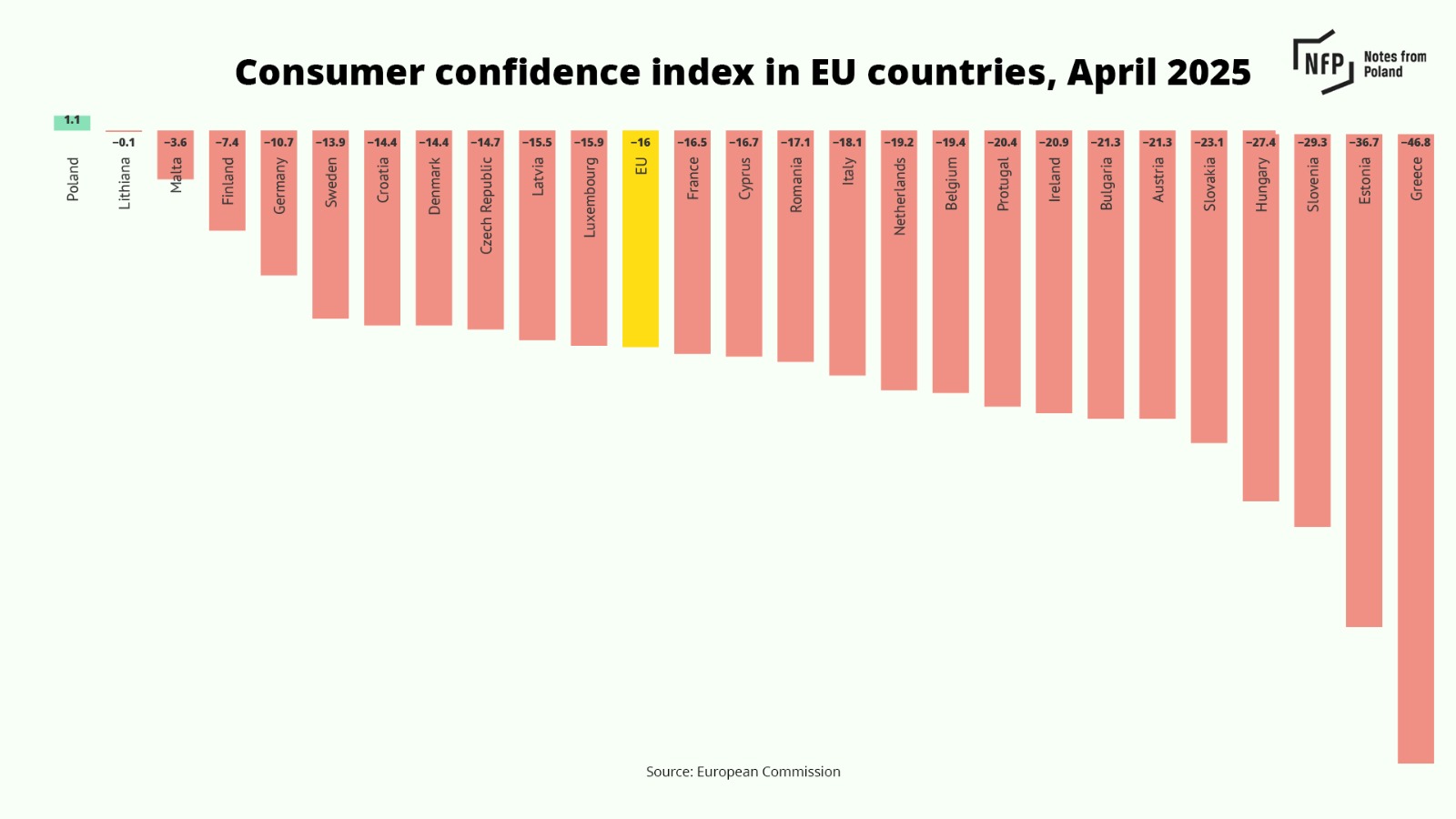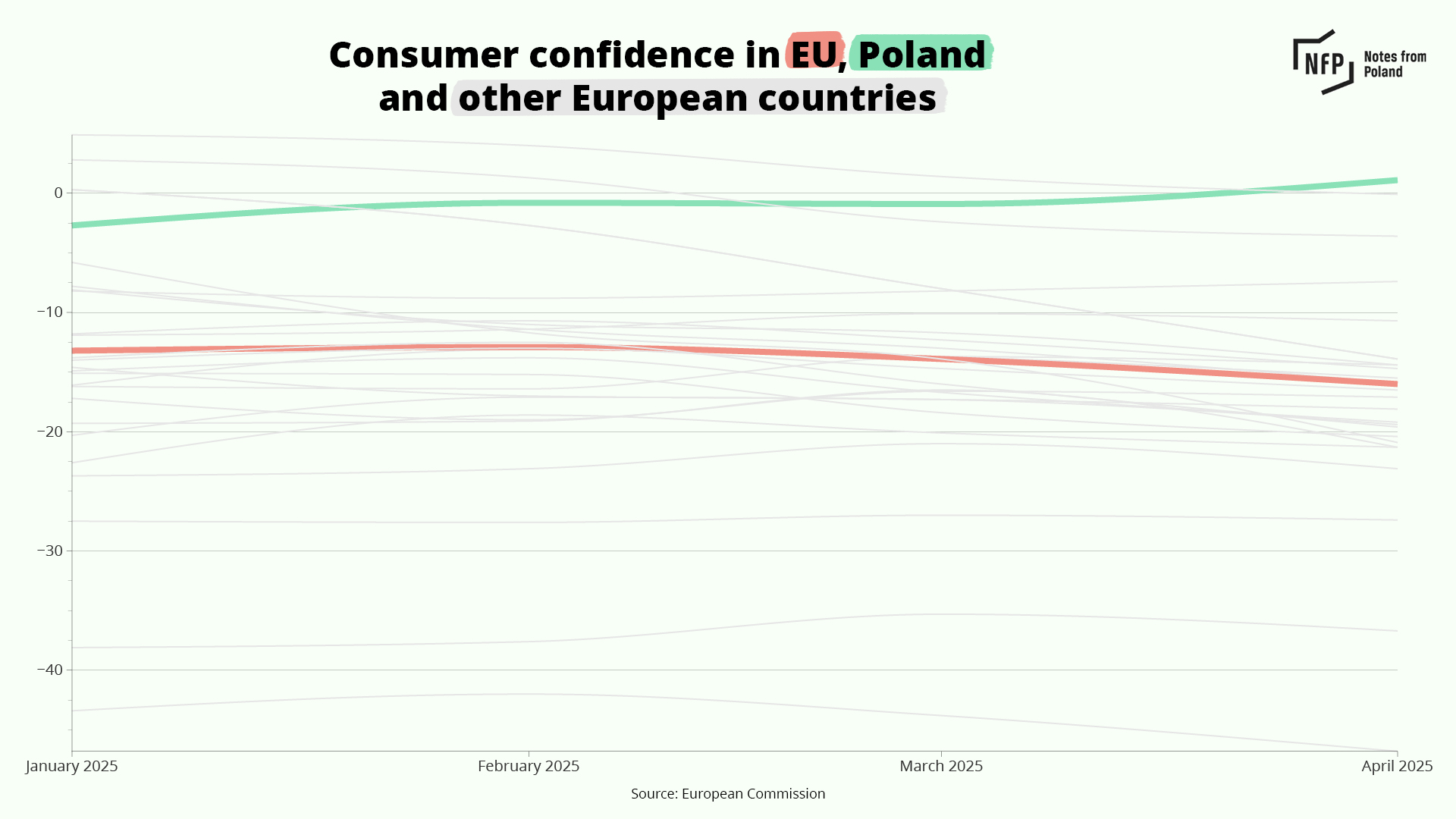Keep our news free from ads and paywalls by making a donation to support our work!

Notes from Poland is run by a small editorial team and is published by an independent, non-profit foundation that is funded through donations from our readers. We cannot do what we do without your support.
Poland was the only European Union country to record positive consumer sentiment in April. It has also seen the strongest rise in consumer sentiment across the EU this year, setting it apart in a region where confidence broadly declined, driven by mounting concerns over global trade instability and future economic prospects.
The consumer confidence index rose by 2 points to 1.1 in Poland last month, the strongest monthly gain across the EU and Poland’s first positive reading since September, according to European Commission data. The scale runs from -100 to +100, with a score above zero indicating positive sentiment.
The next closest performer was Lithuania, where sentiment came in just below neutral at -0.1, followed by Malta (-3.6), Finland (-7.4) and the EU’s biggest country and economy, Germany (-10.7).

The index across the EU as a whole stood at -16, while the strongest negative sentiment was recorded in Greece (-46.8), Estonia (-36.7), Slovenia (-29.3) and Hungary (-27.4).
Consumer confidence declined in 24 EU member states in April, with only Poland and Finland (where it rose by 0.8 points) showing improvements. No data was available for Spain. Overall sentiment across the EU in April reached its joint-lowest level since October 2023.
Since the start of 2025, the EU-wide consumer sentiment index has fallen by 2.8 points. Confidence has declined in 15 countries and increased in 11, with the biggest increases observed in Poland (+3.8%), Romania (+2.2%) and Croatia (+1.8%).

The decline in consumer sentiment across the EU comes against a backdrop of broader geopolitical and economic uncertainty. According to Polish business daily Puls Biznesu, recent trade actions by the United States are a key factor contributing to this downturn.
The newspaper notes that consumer confidence has also deteriorated across the ocean, with the US Conference Board’s sentiment index in April hitting its lowest level since May 2020.
The European Commission’s survey, meanwhile, shows that, while households’ assessments of their personal financial situations have remained broadly stable, expectations for national economic outlooks have deteriorated since November, when Donald Trump won the US presidential election.
In Poland, however, sentiment appears more resilient. Analysts cite several potential reasons: low unemployment, consistently high but stable inflation, and a comparatively muted reaction to political developments in the US.
Poland's unemployment rate of 2.6% in January is the lowest ever recorded in the country by @EU_Eurostat and was the joint-lowest that month among all EU member states
For more, read our full report here: https://t.co/eP5A9JT4eg pic.twitter.com/A9oHu2zLZ6
— Notes from Poland 🇵🇱 (@notesfrompoland) March 7, 2025
Nonetheless, broader indicators of economic sentiment in Poland are mixed. The European Commission’s Economic Sentiment Indicator (ESI), a composite indicator that tracks the overall economic sentiment in the EU and euro area, stood at 101 points for Poland in April, unchanged from March and down 1.5 points year-on-year.
This places Poland 11th out of 30 European economies (the 27 EU member states plus Montenegro, North Macedonia and Albania), above the EU average of 94.4 but well behind regional leaders Malta (108.0), Greece (107.4), Montenegro (107) and Cyprus (106.3).
The ESI is calculated monthly using survey responses from businesses and consumers across the industry, services, retail and construction sectors. A reading above 100 signals above-average economic sentiment, while a value below 100 indicates sentiment is weaker than average.
Poland’s GDP grew by 2.9% in annual terms last year, slightly exceeding economists’ forecasts of 2.8%.
The rebound followed a period of slow growth in 2023, when GDP expanded by just 0.1%https://t.co/CuaVxFRuFG
— Notes from Poland 🇵🇱 (@notesfrompoland) January 30, 2025
Meanwhile, only four countries in Europe recorded positive industrial sentiment in April, with Malta, Greece and Ireland leading the way. Poland was the second most pessimistic economy in this domain, only behind Germany.
Retail sentiment also remains weak at -3 points in Poland, placing it 11th from bottom across the continent. Germany (-26.2) and Hungary (-20.6) posted the lowest readings.

Notes from Poland is run by a small editorial team and published by an independent, non-profit foundation that is funded through donations from our readers. We cannot do what we do without your support.
Main image credit: Kaboompics.com / Pexels

Alicja Ptak is deputy editor-in-chief of Notes from Poland and a multimedia journalist. She has written for Clean Energy Wire and The Times, and she hosts her own podcast, The Warsaw Wire, on Poland’s economy and energy sector. She previously worked for Reuters.



















